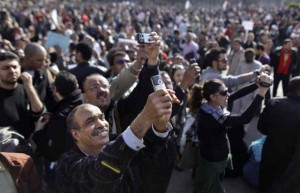The other week I gave an online live-video lecture on our international master programme in Communication for Development, and within this a course on New Media, ICT and Development. I really enjoy taking part and teach in this programme, and the lecture I gave was titled ”Resistance Technologies and Civic Engagement – Digital Media and Political Activism in the MENA-region”. I thought it could be useful to both put out the link and also write an introduction to the subject, or a contextualization for the lecture. So feel free to read the next section and after this introduction you can watch the lecture through the link I will put in the end of the post. Here goes..
Given the expansion of political use of Information and Communication Technologies (ICT), the scholary debate within social sciences in general and media- and communication studies in particular, can be divided in three major catogories. First the empirical and theoretical contributions focusing on whether the use of ICT could embrace deliberative democracy through encouraging a fundamental digital model of democracy. This argument presumes that the normative full potential of the Internet has not yet fully been explored. Second, it is a matter of how citizens are enabled to obtain information on political issues, drawing on studies arguing for diversity and transparency of information. Finally a third category which focuses on participation and more engaging practices of citizens. The common frame of reference involves a notion of a new digital culture, based on late-modern values and central concepts like freedom of expression, social egalitarianism, secularism and interantionalism.
When integrating these theoretical notions on ICT with offline political participation and engagement, the concept of ’digital political participation’ emerges (DPP). This refers to the political activities carried out by citizens through ICT. The theoretical context for DPP is divided between those who argue that online engagement also constitutes an impact factor to offline participation, not least due to the capacity to mobilize and encourage a more passive civic sphere, and those who argue that Internet has no effect at all on offline political participation. The former seem to be the dominant paradigm in the intellectual discussions on the impact of ICT on social and political change and in either case the participatory culture of and through ICT that has emerged has marked the development and use of media technology, especially in relation to the rapid growth of social movements and NGO:s.
Several studies on political activism have connected to a rather complex field of social movements and their organizational use of new media. One of the first and most recognized examples is the Zapatistas, a peasant movement based in the city of Chiapas, Mexico, fighting for a more decentralized structure of society. The movement has since its formation in early 1990’s included an extensive use of ICT as a significant mean of political activism in order to spread their message and recruit more support in the struggle against the Mexican state. Even though political activism has been carried out through and with help of media platforms before, the digital activism as a tool for mobilization and organisation is due to the expanding ICT development during the 1990’s and onwards. While anti-nuclear movements, peace movements as well as feminist groups several decades were to use radio, television and magazines to promote causes in the middle of the last century, current media landscape provides completely different possibilities to engage and recruit through media technology.
It is important to consider the fact that the emergence and growth of early social movements in the 1950’s went in parallell with the expansion of mass media technology, especially television in US and Europe. Television played a significant part of the movement’s development in both national and trans-national sense. In this context, television also put emphasis on the ambivalence of universalism vs. particuralism in modern politics. On the one hand it provided a national mediated public sphere contributing to re-construct national identities, and on the other hand opened up to closed cultural horizons, de-mystifying foreign cultures. During the Vietnamn war, the US government could use television for national mobilization, and at the same time the anti-war movement could gain support through the televised images from the war that was being broadcasted to a mass audience in the news. Another example is the role of television in former Eastern Europe during the 1970’s and 1980’s. State ambitions to create a politically controlled cultural unit were mainly implemented through a strategic, censored and governed use of television. At the same time, as studies in the aftermath of the collapse of communism have showed, television and the contemporary boundarylessness in information and communication during the 1980’s undermined government social control of its population.
Since then the role of media technologies has been more associated with and discoursively focused on Internet and mobile communications. The earlier mentioned Zapatista movement’s use of ICT is here considered a corner stone in the discussion on media technology and political change. However, the more recent and still ongoing events and uprisings in the Arab World starting in late 2010 is not only an illustrative case for understanding the role of technology in relation to promoting social and political change, but also an example of how an often used celebration of technology (liberation tools) has backdrops that need to be included in the framework for grasping the current media landscape and patterns of communication. One of the key issues and starting points is adequate to emhasize already here; namely the complexity of dealing with an illuminative and blurry dimension of traditional politics and right-wing scales. Social movements, NGO:s, grassrot-movements and political activists targeting traditional politics extend former limitations of democracy and thereby constitute an important object of study, not least seen in the MENA countries (Middle Easterns and North Africa). The relation between online and offline mobilization of citizens struggling for freedom against authoritarian states and governments during the Arab Spring has though sometimes been approached through rather simplified arguments, especially in the news media, favouring the notion of media technology as the main trigger of these events. And it is the simplification on the role of technology that empowers a need to contextualize and consider explanatory models for the implications of a recurrent praising of technology during civil unrest and political upheaval. It is vital to acknowledge the field in which questions of how we view the role and significance of ICT in socio-political development and as potential link between online and offline political engagement, is placed. Considering the present media ecology as a network society one must pay attention to the mechanisms behind the perception and ideological understanding of the contemporary role of technology in this rapidly evolving digital media landscape.
You can watch my lecture HERE (please fast-forward to about 12.30 in the clip)

